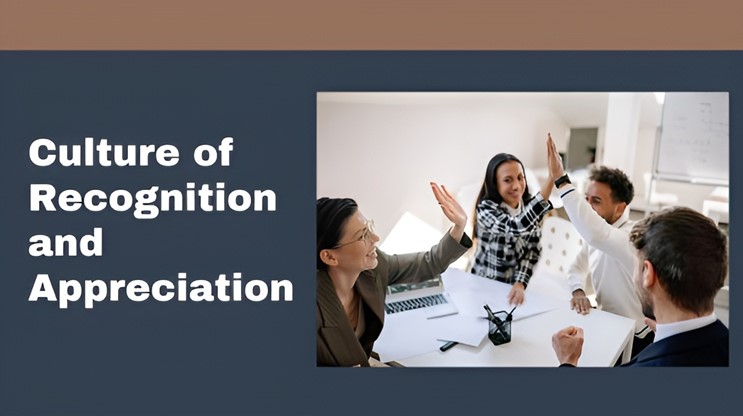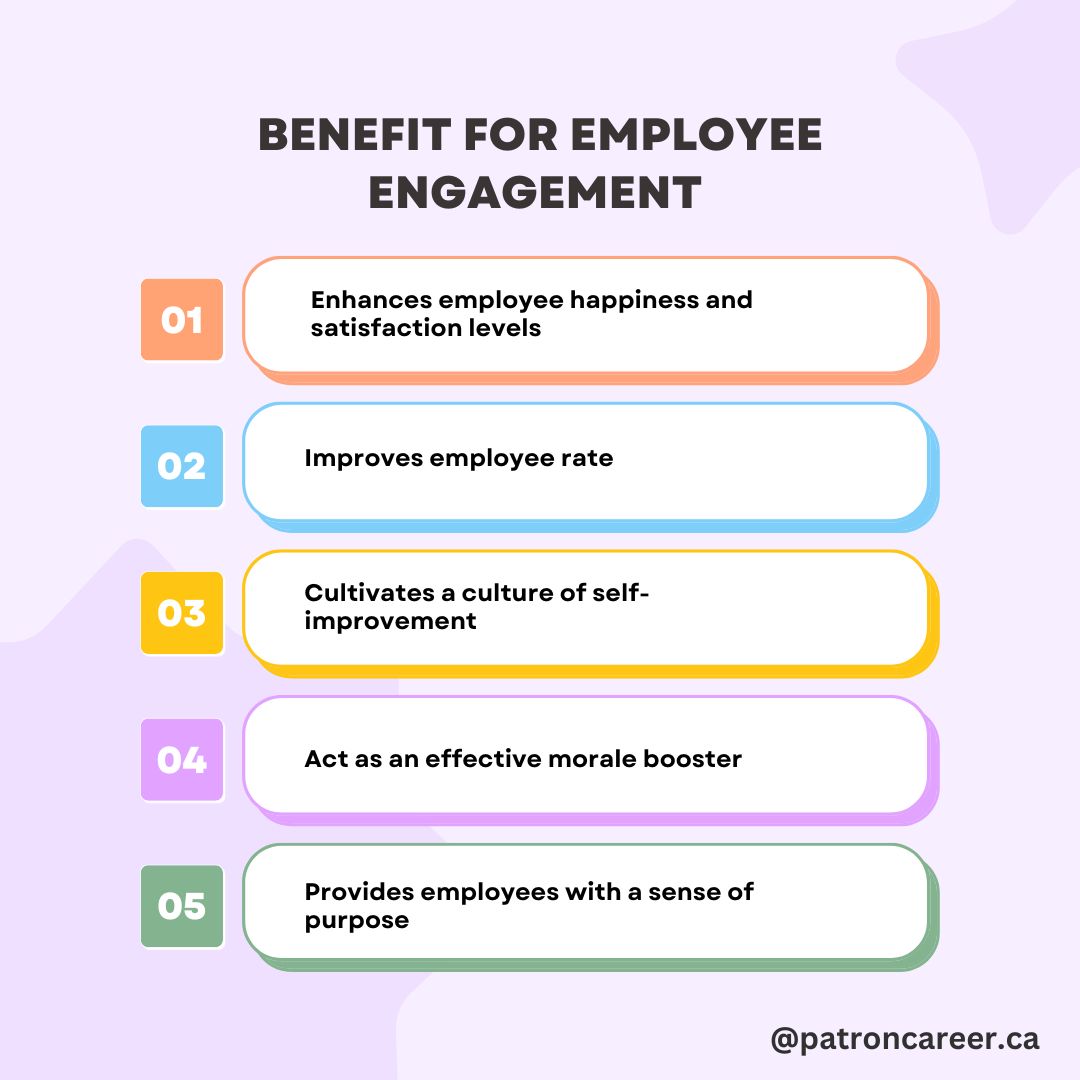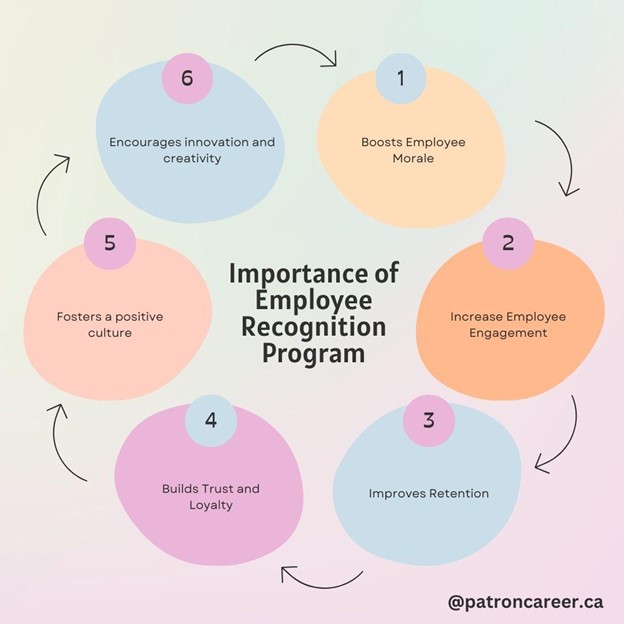
Employee’s Job Performance
18 April, 2024
Patron Career Staffing firmly believes in adopting a tailored approach to meet temporary and permanent recruitment needs. We safeguard the interest of our clients by finding such workers who are knowledgeable and reliable.
About UsNeed help? Make a Call
32 Dundas Street East Unit A, L5A1W2

In today's fast-paced work environment, building a culture of recognition and appreciation is more crucial than ever. A workplace where employees feel valued and acknowledged for their contributions is the foundation of a motivated, engaged, and productive team.
This article delves into seven surefire strategies to cultivate genuine appreciation, including leadership's crucial role, peer recognition programs, and celebrating milestones. Implementing these approaches will create a positive feedback loop that fuels success and drives your organization to new heights.
The Immense Value of Employee Recognition
Recognition is more than just a pat on the back – it's a powerful catalyst for motivation, engagement, and productivity. Consider these statistics: 65% of employees would work harder if their efforts were better recognized, and businesses see a staggering 31% boost in productivity when employees feel appreciated. At its core, recognition taps into the fundamental human need for appreciation and affirmation. When employees feel their hard work is valued, they are driven to consistently deliver their best performance. This positive reinforcement creates a self-perpetuating cycle of excellence.

The Engagement Factor
Recognition directly impacts employee engagement, which is essential for creating a connected and committed workforce. Engaged employees take pride in their roles and foster a sense of belonging throughout the organization. This collective investment in the company's success is invaluable, as an engaged team is high-performing. When recognition is a core part of the culture, it creates an environment where people are motivated to go above and beyond.
1. Recognition is not just about praising for tasks done well, it's more about fuelling the motivation of employees through a non-monetary method. It ignites passion, and creativity and boosts employee morale.
Laying the Foundation: Leadership's Crucial Role
Building a culture of recognition starts at the top. When leaders actively champion and prioritize appreciation, they set the tone for an environment where every contribution is celebrated.
Aligning Recognition with Organizational Values
Recognition efforts should be strategically aligned with the company's core values and overarching goals. This ensures that acknowledged behaviors and achievements directly contribute to the organization's mission. For example, if innovation is crucial, recognition could highlight employees who develop creative solutions or think outside the box.
Leading by Example
Leadership's involvement goes beyond policy – it's about embodying the desired culture. Encourage leaders to personally demonstrate the attitudes and behaviors that reflect a culture of recognition. This could involve publicly acknowledging team members' achievements during meetings or writing personal notes of appreciation.
When leaders visibly prioritize recognition, it creates a ripple effect throughout the entire organization, fostering a workplace where appreciation is woven into daily operations.
Peer-to-Peer Recognition Programs
While top-down recognition from leadership is invaluable, the power of appreciation multiplies when it comes from peers. There's a unique energy and impact when colleagues personally acknowledge each other's efforts and achievements.
Fostering a Culture of Mutual Appreciation
Develop an environment where expressing gratitude towards teammates becomes second nature. This could involve setting aside time during team meetings for 'shout-outs' or creating dedicated channels (e.g., Slack or Teams) for public kudos. Encourage employees to celebrate significant wins and acknowledge the small, day-to-day contributions that keep projects moving forward.
Formal Peer Recognition Platforms
Consider implementing a formal peer-to-peer recognition system or platform to take it further. These digital spaces allow employees to publicly applaud and recognize their colleagues' contributions, making appreciation visible and transparent across the organization. Such initiatives boost morale, strengthen team bonds, and foster a collaborative, supportive culture where everyone's efforts are valued. When peers regularly express gratitude, it cultivates an atmosphere of mutual respect and camaraderie.
Personalized Recognition That Resonates
One size does not fit all when it comes to recognition. Understanding individual preferences and tailoring appreciation can significantly impact how it's received and perceived.
Exploring Different Recognition Types
Take the time to learn what types of recognition resonate most with each employee. For some, public praise during team meetings may be motivating, while others may prefer a handwritten note or a small token of appreciation. You could gather this insight through short surveys or casual conversations.

Thoughtful, Personalized Gestures
When it comes to employee recognition gifts or gestures, personalization is critical. A thoughtful item related to an individual's hobbies or interests demonstrates that the recognition is sincere and tailored to them as a person, not just a formality. Personalized gestures make employees feel genuinely seen and valued.
This level of personalization adds a meaningful touch to recognition efforts. Generic, one-size-fits-all recognition can start to feel impersonal over time. But tailoring appreciation shows you're trying to celebrate what makes each employee unique.
Celebrating Milestones and Major Achievements
While tenure-based recognition is essential, there's a broader landscape to explore when celebrating success. Acknowledging major milestones, project completions, and exceptional performance cultivates a culture where achievement is celebrated at every turn.
Marking Significant Moments
Consider organizing celebratory events, awards ceremonies, or special gatherings to highlight the accomplishments of individuals and teams. These occasions create a sense of pride and accomplishment, encouraging a workplace where everyone strives for excellence. Mark the completion of major, long-term projects or hitting ambitious goals with parties, awards, or other celebrations.
Providing a Sense of Closure and Motivation
Recognizing milestones doesn't just provide a sense of closure and satisfaction for completed projects – it also motivates employees to set and reach new goals. This continuous cycle of achievement and appreciation fuels a driven, high-performing workforce. After celebrating a win, employees are re-energized and ready to take on new challenges.
Developing Recognition Skills Through Training
Like any skill, the ability to give meaningful recognition can be developed and honed. Providing resources and training on effective appreciation equips employees with the tools to express gratitude authentically.
Workshops on Sincere Acknowledgment
Consider offering workshops or training sessions focused on the art of recognition. These should go beyond the basics, delving into the nuances of delivering sincere, impactful appreciation without feeling contrived or forced. Share examples of great recognition and allow employees to practice giving feedback.
Fostering an Environment of Positive Feedback
The goal is to empower employees to give and receive recognition confidently and comfortably. Foster an environment where positive feedback is encouraged and celebrated, making recognition a natural part of the workplace culture. Provide forums for peers to praise one another publicly and privately.
Developing strong recognition skills takes practice. But it's an investment worth making, as it equips your workforce to spread authentic appreciation and all the motivational benefits it brings.
Continuously Evaluating and Refining Efforts
Building a culture of recognition is an ongoing journey, not a one-and-done initiative. Continuously evaluating the impact and effectiveness of your recognition programs is crucial to ensuring they remain relevant and impactful.
Gathering Employee Feedback
Utilize employee surveys, focus groups, or other feedback channels to gather insights on what's working well and what areas could use improvement. This valuable input from the people directly impacted by recognition efforts can help guide refinements and adjustments. Ask questions about how motivated employees feel by current initiatives.
Adapting Based on Results
Track relevant metrics like employee engagement, satisfaction, and retention rates to measure the tangible impact of your recognition strategies. Use this data to identify potential areas for optimization and adapt your approach accordingly.
If specific departments or teams seem less engaged despite recognition efforts, dig deeper into why. Remaining agile and responsive ensures that your recognition efforts resonate with your evolving workforce's needs and drive meaningful results for your organization's goals.
FAQs:
How can we ensure recognition efforts are consistent and sustainable?
Embedding recognition into daily operations through leadership involvement, peer programs, and regular training helps make appreciation a lasting part of the culture. Continuously gathering feedback and refining strategies is also crucial.
What if we have a limited budget for recognition programs or rewards?
Recognition doesn't have to be expensive. Simple, sincere gestures like verbal praise, handwritten notes, or low-cost personalized tokens can be just as impactful. The key is making employees feel genuinely valued.
Conclusion
Recognition is more than just a feel-good initiative. It's a strategic investment in your organization's success. By fostering a culture of genuine appreciation, you create a positive, productive environment where employees feel valued, motivated, and driven to excel. Building this culture is an ongoing commitment that requires consistent effort and refinement. But the payoff is immense: a thriving, engaged workforce united in their dedication to your company's mission. So embrace the power of recognition, and watch as your workplace transforms into a hub of collaboration, innovation, and unparalleled achievement.
